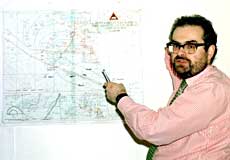|
Denial of impact on health |

Chris Baker pointing to a map showing the movements of British soldiers. "The soldiers in the Gulf War were exposed to very little contamination." |
The building housing the British Ministry
of Defence stands on the bank of the Thames
River flowing through London. Guided by a
public relations staff, I walked through
a long corridor. On arriving by elevator
at the appointed room, I was welcomed by
Chris Baker, head of the Gulf Veterans' Illnesses
Unit (GVIU).
![]() Accepting a certain level of risk
Accepting a certain level of risk
"The veterans are making claims about the impact of depleted uranium (DU) on their health, but we do not believe it has any such effect." Baker had a stubbly beard and a stern expression. It was the answer I was expecting.
"Because it is a toxic heavy metal like lead, DU does release a small amount of radiation. We realize that there is a certain level of risk. However, in the 1991 Gulf War, British soldiers fired only one hundred 120mm shells, no more than about one ton. We had no casualties from friendly fire as the Americans did. There was almost no possibility that British soldiers inhaled DU particles, which is said to be the danger."
The veterans, of course, claim that far more DU rounds were fired, during test firing in Saudi Arabia before the start of combat as well as during the ground war against Iraqi tanks (February 24 to 28).
The US Defense Department admits that the US and British used a combined total of about 950 thousand shells (about 320 tons) over a large area. Is it irrelevant that many of the 30,000 British troops were in the affected areas?
"According to our tests, even when a
tank is hit, only 10 to 20 percent of the
DU penetrator is released as fine particles.
And nearly all of those particles fall inside
or within a few meters of the tank. Furthermore,
even those who looked into destroyed enemy
tanks stood there only briefly. They could
not have inhaled enough particles to impact
their health. Most of the shells were never
exploded, so even with other firing in the
area..."
![]() "Minimal" environmental contamination
"Minimal" environmental contamination
Knowing that DU munitions involve a certain level of risk, why did you not give your soldiers advance warning so they could protect themselves? Baker responded without hesitation, "The war unfolded so quickly there wasn't enough time."
A number of veterans have had DU detected in their urine in tests by independent American and Canadian nuclear chemists. Baker rejected this point outright. "We are aware of the testing, but we are not sure how scientific the results are. Furthermore, there is no evidence that DU in the urine is related to any particular illness." And he added, "The Ministry of Defence has a medical examination program for the veterans, and we offer our own urine tests. There simply are no veterans coming in for the exams."
Regarding environmental contamination in
Iraq and other areas of the Middle East areas
where large amounts of DU were used, Baker
states the Ministry's conclusion. "We
do not say there is no contamination at all,
but it is not enough to impact human health
or the environment." And he does not
reject the possibility of using DU in future
conflicts. "For the British military,
DU munitions are valuable conventional weapons,
and we have no intention of removing them
from our arsenal."
![]() Someone else's problem
Someone else's problem
The Defence Ministry admits that, compared to other wars or conflicts in which British troops have been involved, the Gulf War has produced a conspicuous number of veterans complaining of health problems. If these problems are not the result of DU, what is the cause?
"Like the American soldiers, most British soldiers sent into combat took pyridostigmine bromide (PB) as an antidote to chemical weapons. The health problems could be side effects of PB, or of the vaccine they received to protect them from biological weapons. Some have also suggested it might be the smoke from oil field fires or chemical weapons used by Iraq. At this point, however, we simply have no scientific evidence indicating that it was any of those. It remains a mystery."
Baker spoke as if this mystery had nothing to do with the Ministry of Defence. I was reminded of a similar detachment I encountered when interviewing a spokesman for the Pentagon. Given the veterans' distrust of the Defence Ministry, it's no wonder the veterans go elsewhere for examinations.